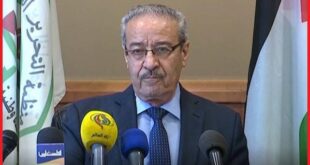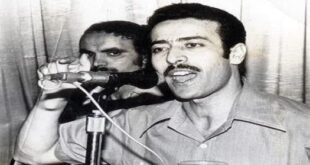Tayseer Khaled, member of the Executive Committee of the PLO, member of the Political Bureau of the Democratic Front for the Liberation of Palestine, warned during an interview with the media of the danger of use of early Israeli elections by Benjamin Netanyahu’s as a launching pad for a massive settling assault in the West Bank, including Jerusalem , through expanding the settlement of Ephrat over 1200 dunums in Bethlehem governorate. The Israeli government is implementing a large-scale construction plan in the Efrat aria south of Bethlehem that will siege the city and prohibit it from expanding . The so called Civil Administration designated this area for the scope and transferred it to the Ministry of Construction and Housing last month, in an action that allows the planning of the district, which will be called “Giv’at Ortam” ” . The establishment of this new settlement requires a number of activities, especially the construction of new roads and infrastructure, in preparation for its establishment. 14 ministries will be involved allocating funds from their budgets to support this plan.
“This plan is an extension of a large-scale settlement project that the Israeli government has been preparing for years. The Israeli army has confiscated 1700 dunums in 2009 from private land of citizens in the region in order to expand “Gush Etzion” settlement. By confiscating land and treating it as “state land,” the Israeli authorities aim to pave the way for the settlement to begin the process of obtaining government approval to build 2,500 housing units there. This project comes as part of Netanyahu’s efforts to win the votes of the Israeli right wing. The expansion of Efrat is described as an E2 plan similar to the E1 plan in East Jerusalem, which aims to isolate the holy city from the occupied West Bank by connecting Jerusalem with the settlement of Maale Adumim to the Dead Sea, thus severing the West Bank and completely isolating Jerusalem from Its Palestinian surroundings.
He stressed that it is clear that the Israeli occupation government is working at high rhythm, especially at the sight of the early elections of the Israeli Knesset to impose facts on the ground by accelerating the process of construction and expansion of settlements and the approval of additional settlement schemes, never encountered before, in order to tighten control over the Palestinian land in the West Bank, including Jerusalem . In the context of the ongoing settlement plans, the Israeli occupation government plans to launch a plan to expand the construction of more settlement units near the Efrat settlement south of Bethlehem by building 2,500 settlement units on the land of Khirbet al-Nahla, south of Bethlehem, (Ie 2), an attempt to prevent any development or expansion in the city of Bethlehem, which prevents the settlement of Har Homa to expand it from the northern area, which means impeding any expansion of the city to the north and south. The establishment of an “agricultural farm” in the E, in addition to the publication of notices on its website confirms that it intends to plan for the construction of hundreds of housing units on 1182 dunums of land in the region.
In the event that 2,500 additional settlement units are built, the project could transform the settlement into a new city, joining four settlements classified as Israeli cities: Elit (south of occupied Jerusalem), Betar Illit (south of Jerusalem and west of Bethlehem) (East Jerusalem) and “Ariel” on the lands of the governorate and the city of Salfit south of Nablus (north of Jerusalem).
In response to a question about Israel’s settlement activity after the election of Donald Trump as president of the United States, he explained that the settlement activity has duplicated several times with the administration of President Trump, where the data appear according to Israeli data, including those documented by Israeli organizations against settlement such as Peace Now “The decrease in the settlement construction activity from about 3066 housing units in 2016 to 1643 units in 2017 was a result of the decrease of settlement projects in the last two years of former US President Barack Obama mandate, while jumped by 2.5 times to 6712 units in the first 9 months of 2018 compared to 2016, meaning that there was a huge increase in settlement activity last year, acquired construction tenders on the largest increase in this activity. Thus, settlement activity jumped to the highest level recorded by data on Israeli settlement activity in the West Bank since year 2002.
According to the National bureau for Land Defense and Settlement Resistance, 87% of the new housing units will be built in “isolated” settlements, therefore outside the settlement blocs, while thousands of housing units are being planned in settlements east of the separation wall in the West Bank and a few hundreds more in settlements West of the wall, including 121 housing units in the settlement of Yitzhar, south of Nablus, which is considered a stronghold of extremist ultra-settlers and Jewish terror organizations, along with the establishment of two industrial zones near the settlements of Avni Hefts and Betar Illit, settlement The two outposts are given legal status and are the focus of “Ibi Hanahal” and “Gafa’ot”. While another plan calls for the establishment of a new settlement near the “Mishneh Danny” settlement outpost in the form of an internal educational institution that constitutes housing.
In his response to the question on the national strategy to confront the threat of Israeli settlement, Tayseer Khaled said: Unfortunately, there is no national strategy in the comprehensive political meaning to face the threat of settlement, which is an imminent threat to the unity of the national territory and to the Palestinian national presence. What we have are policies that deal with settlements through reactions that succeed here and fail there, while settlements expand and deepen and spread like cancer in the West Bank, including occupied Jerusalem. I mean are sporadic field battles in which citizens offer sacrifices in defense of the land and resisting settlement without noticing that these areas threatened by settlement are considered in the official Palestinian policy as prioritized areas of development in terms of public budgets allocations to support the steadfastness of the citizens and development of the agricultural sector and job creation for the Palestinians. The allocation of the Ministry of Agriculture, for example, in the public budget does not exceed at best one percent of the general budget. Thus, for example, ministries and public administrations concerned, for example, Services and structural plans and infrastructure in rural areas, while security spending accounts about a third of the general budget. This is an incorrect situation and needs to be corrected so that a national strategy for addressing the threat of settlement can be faced. At the local political level, the Oslo restrictions constitute a serious obstacle to the development of a comprehensive national strategy to confront settlements. The Oslo Accords divided the West Bank into areas in the following manner: This is yours: Area A “ for the Palestinian Authority” and this is mine: Area C (the Israeli Civil Administration, the civilian arm of the occupation authorities. These are for you and for me : Area B. In this context, it is impossible to talk about a national strategy to confront the settlements. The condition of the search for a strategy to confront the settlements takes place if we are liberated from the Oslo restrictions and we are. The registration of land in the West Bank turned into a power capable of enforcing a law to settle the land and register it in the name of its owners and at the same time extend the jurisdiction of the law and the Palestinian courts to all residents of the territory of the State of Palestine under occupation as defined by UN General Assembly Resolution No. 67/19 of 2012 and sought The judiciary and the courts of international justice and international police (Interpol) in order to bring all the violations on Palestinian land to international justice. This is a battle that deserves to be fought with all strength and determination, because it is a national strategy for confronting settlements.
I do not underestimate the importance of the peaceful popular resistance to the settlements taking place in more than one place in the West Bank, including Jerusalem. There are excellent examples of steadfastness against the bulldozers of the occupation and the occupation flocks in Bil’in, Ni’lin, Ma’asara, Azzun, Atzmeh Atmeh, Kafr Qaddum, Burin, Auref, Asira, Qaryut, Jalud, Qasrah, Jureish, Eastern Lebban and many others where the citizens fight their battles against the settlements and make sacrifices worthy of appreciation and respect. And stop the march of settlement, stop the wheel of confiscation of land and the settlement movement is the constitution of a popular resistance in the countryside inspired by the experience of the stone intifada in 1987 in terms of wide participation and inspired by the uprising of gates in the holy Al Aqsa mosque in July 2017, which was moving towards national disobedience which forced the occupation to step back on its decision.
On the legal and political procedures at the international level, Khaled called for a wide variety of forms to face the settlements, the UN Security Council should be constantly called and the great achievement accomplished in the Security Council at the end of 2016 (UN security council resolution 2334) should be taken into account. To continue its responsibilities in pushing Israel to respect that resolution and other resolutions that criminalize settlement activities and considers them illegal and calls on Israel to cease them unconditionally, even if the United States will use veto each time we call the Council intervention. The implementation of Resolution 2334 should be our battle to isolate Israel and the United States, and to show them the appearance of brute force that is disrupting international law, international justice and international legitimacy. In addition to the Security Council, there is also the UN General Assembly and the importance of opening its doors under Chapter VII of the UN Charter every time the US administration tries to disrupt international law and international legitimacy in the Security Council. There is also the International Criminal Court, which must be put under political pressure and to focus on article 8 of the Rome Statute of the International Criminal Court, which considers the settlements a war crime and based on the official Palestinian complaint and transfer the complaints to the judicial division of the court and ask to begin investigations into Israeli settlement crimes in the West Bank, including Jerusalem.
In addition to this level of action in the UN Security Council, in the UN General Assembly and in the ICC, there is a need to act politically at our relations with the Arabs and with our friends as well as with the groups of countries and calling them to exercise their role in exerting pressure on the Government of Israel to stop settlement crimes and to use the policy and language of interests. Including the use of the economic relations and policy of criminalization and prohibition of the entry of products of agricultural and industrial settlements and services to the markets of the world with a focus here on countries or groups of countries that have trade agreements as in the case of the European Union. The partnership agreement between Israel and the European Union states that Israel must respect human rights in the Palestinian territories occupied since 1967. Since Israel does not respect this condition, we must knock the doors of the EU countries together and individually and invite them at every opportunity to use their relations and influence to push Israel to respect the conditions. The aforementioned partnership agreement, not to mention the demand of these countries or most of the need for the response of their governments to the positions of their parliamentary councils, which called on more than one occasion to boycott the explicit and clear products of settlements instead of the policy of marking these products, which do not work to put pressure on the government. This is in addition to its demand to recognize the State of Palestine on the borders of June 4, 1967, in accordance with General Assembly Resolution 67/19 of 2012 to curb Israel’s encroachment on the so-called two-state solution.
The elements of this strategy that are absent so far are common between the requirements of stopping the deterioration in the Palestinian national internal relations and entering into a comprehensive national dialogue to stop the black division. In terms of Israel, we need freedom from the restrictions of the agreements signed between the two sides, beginning with the Oslo Accords and ending with the Paris Economic Agreement and the requirements of the internationalization of rights and the Palestinian national issue and the battles in all international forums Intention.
 المكتب الوطني للدفاع عن الارض ومقاومة الاستيطان منظمة التحرير الفلسطينية
المكتب الوطني للدفاع عن الارض ومقاومة الاستيطان منظمة التحرير الفلسطينية




